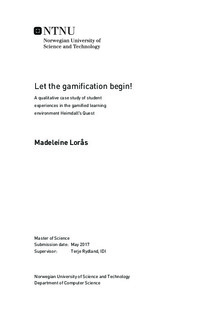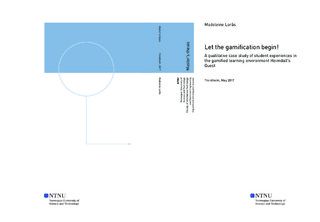| dc.description.abstract | Educators in classrooms all over the world are focused on integrating and utilizing new technologies that can help with the challenge of unmotivated students. At the same time, digital games have the ability to engage children and adults in complex problem solving and creative activities with high motivation for long periods of time. What happens when these worlds collide in a gamified learning environment?
The aim of this study was to answer the research question How does gamification affect students' experienced learning environment? More specifically, I wanted to find out more about what characterizes the gamified learning environment created by the Heimdall's Quest system, and to what extent commercial gaming experience can be significant.
By conducting an iterative case study consisting of observation and interviews with teachers and students participating in the motivational classroom system Heimdall's Quest, I was able to gain knowledge about student experiences in a gamified learning environment. Constant comparative analysis of these datasets found that there are three levels to a gamified learning environment: the student level, the classroom level and the society level. Furthermore, my research found that on the student level, playfulness and repetition is essential for extrinsic motivation and competitive features to have a positive effect. On the classroom level, the teacher has great importance in the development and implementation of effective gamified learning activities, where students are able to utilize their skills and knowledge from commercial gaming and take responsibility for their own learning. Lastly, the gamified classroom provides a learning environment where the students' gaming experience is valued, which can improve their self-perception and identity. The findings of this study may give valuable insight to other educators in developing and implementing gamification as a learning tool for the future. | |

